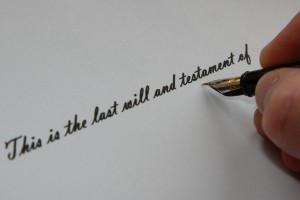
Michigan’s Holographic Will Requirements
Under Michigan’s Estates and Protected Individuals Code (also known as “EPIC”), a will is valid if it is in writing, is signed by the testator (the person making the will) and is witnessed and signed by at least two other individuals. However, a will can still be considered valid even if it doesn’t meet these requirements. One of the exceptions to these requirements is the holographic will.
Michigan is one of several states that recognizes and accepts holographic wills. A holographic will is a will that is handwritten by the testator and is not witnessed. In order for a holographic will to be recognized in Michigan, it must meet the following requirements:
- The holographic will must be dated,
- The testator must sign the holographic will,
- Material portions of the will must be in the testator’s handwriting, and
- It must be evident that the document was intended to serve as testator’s will.
Material portions refer to the substantive contents of the will, such as who the devisees are (individuals who receive property under the will), who the personal representative will be and/or who will have guardianship over the testator’s children (if applicable).
In deciding whether a given writing constitutes a holographic will, a court may look to other documentation, including documentation that is not handwritten by the testator.
While holographic wills are possible, there are several avenues for possible contention by someone who may disagree with what the will states. For example, is the document purported to be a holographic will really in the testator’s handwriting, or is it a forgery? What if there are other documents dated after the holographic will, that appear to contradict what the holographic will says? Due to the potential for uncertainty, one should be very careful in relying on a holographic will.
For more information about holographic and other types of wills, please contact us.




